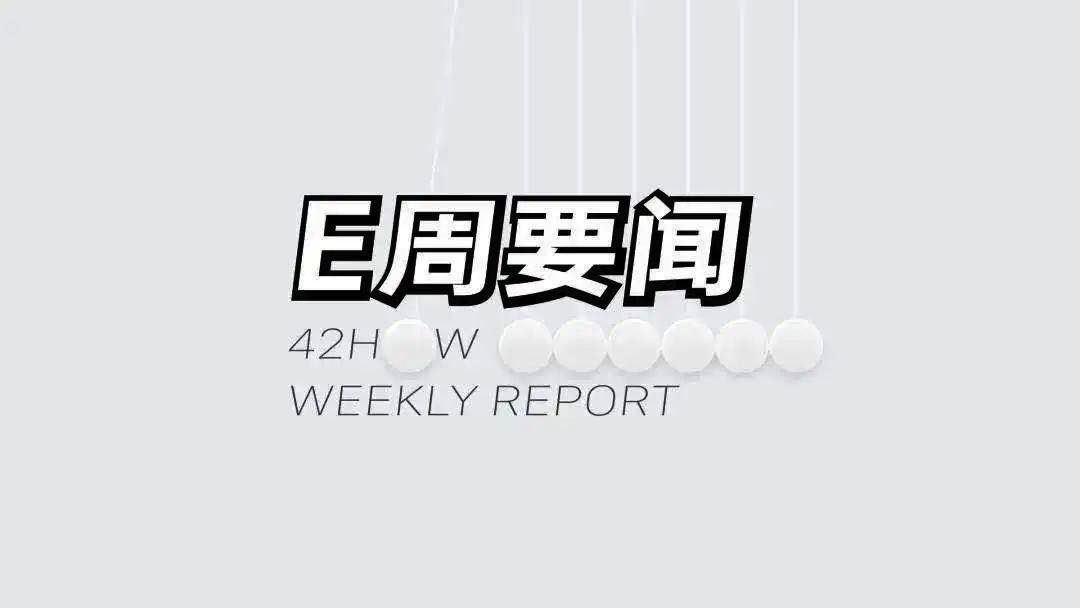Weekly Index



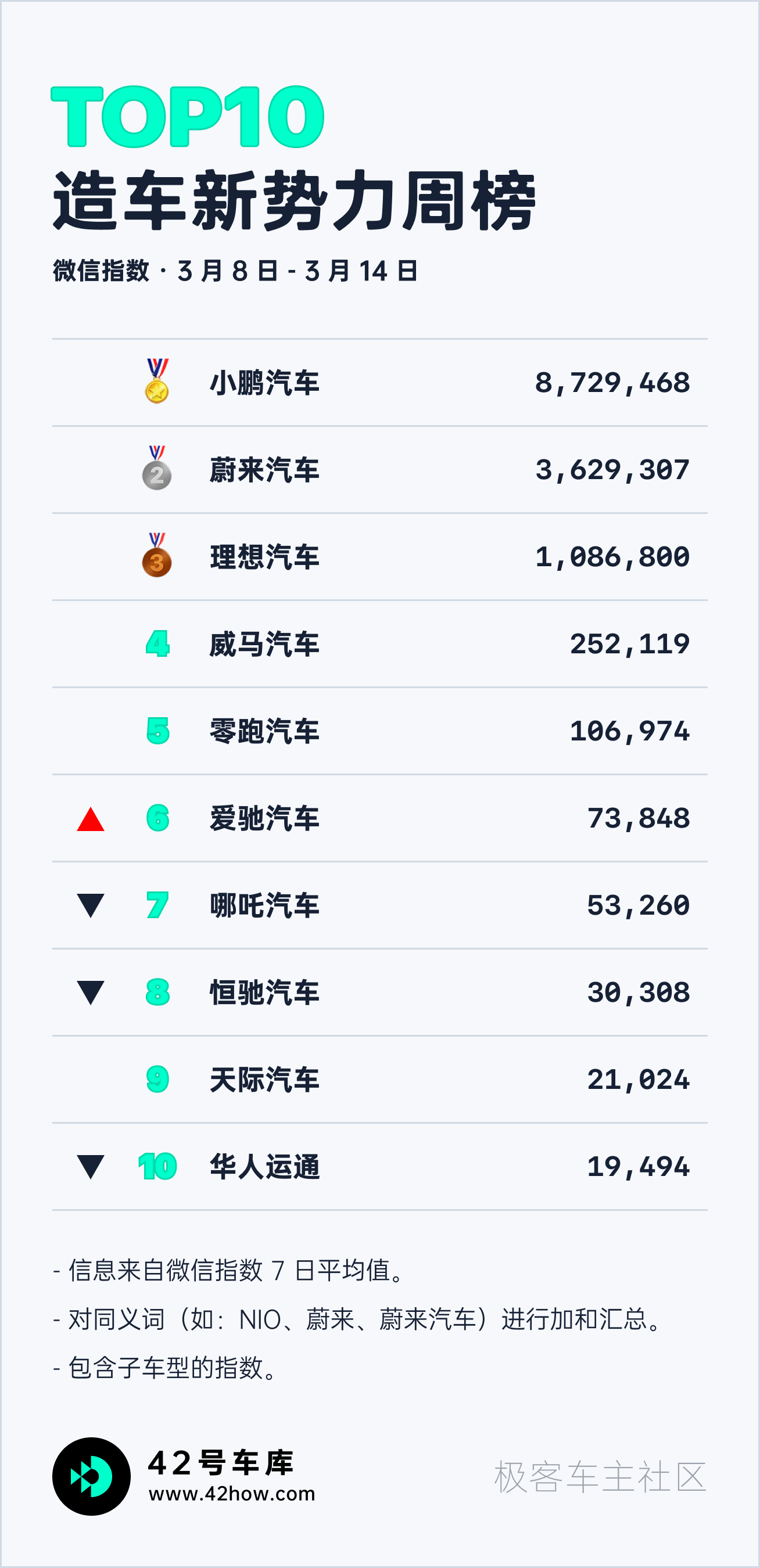
Weekly News
MINI Plans to Stop Selling Fuel-Powered Cars by 2030
According to German magazine “Der Spiegel”, MINI plans to stop selling fuel-powered cars by 2030, with the last fuel-powered car to be released in 2025. By 2027, half of MINI’s sold models will be electric vehicles.

As the parent company of MINI, BMW Group plans to increase the production of electric vehicles by 25% and raise its sales share from the current 8% to 20% between 2021 and 2023, hoping to expand its market share further, but it has not yet announced the specific timetable for its electrification transformation.
Expert Commentary:
According to the current schedule for electrification transformation, MINI will be the first brand under BMW Group to complete the full electrification transformation. Compared to other brands, MINI only has three models, Cooper, Clubman, and Countryman, making it relatively easy to undergo electrification transformation.
Other traditional auto companies have also announced similar plans. Daimler stopped developing internal combustion engines in 2019. Jaguar plans to achieve full electrification for all products by 2025. Volvo plans to stop producing fuel-powered cars from 2030 and only sell electric vehicles. General Motors plans to produce only electric vehicles after 2035 and achieve carbon neutrality by 2040.
XPeng Motors Establishes New Company in Hefei to Operate Automotive Leasing and Sharing Business
On March 12th, according to data from Qichacha, XPeng Motors established a new company in Hefei, named Hefei Pengzhi Automotive Sales and Service Co., Ltd.Translate the following Chinese text in Markdown format to English Markdown format while retaining the HTML tags inside the Markdown. Only output the corrected and improved parts while keeping the meaning.


(Image source: QiChaCha)
The new company’s scope of business covers new energy vehicles, electric vehicle accessories, motor vehicle charging sales, automobile parts and charging pile retail, car rental, car sharing rental services, car market management services, car exhibition services, and motor vehicle parts market management services.
Quick Comment:
Today, XPeng Motors also announced a strategic cooperation with Guangdong Yueda Investment Holdings Co., Ltd. The two parties have reached a cooperation agreement of 500 million yuan on the investment of Yueda in XPeng’s subsidiary, Guangzhou Orangexing Intelligent Automotive Technology Co., Ltd.
Currently, XPeng Motors has invested in dozens of companies such as Beijing XPeng Automobile Co., Ltd., Hangzhou XPeng Automobile Co., Ltd., Zhengzhou XPeng Automobile Sales Co., Ltd., etc. XPeng’s control of the entire automobile industry ecology is gradually forming in an orderly manner.
Evergrande Motors joined forces with Tencent to establish a joint venture company
On March 15th, Evergrande Motors announced that it had signed an agreement with Wutong Car Alliance Technology Co., Ltd., a subsidiary of Tencent Holdings Limited, to set up a joint venture company with respective contributions of 60% and 40%, and jointly develop the car’s intelligent operating system.
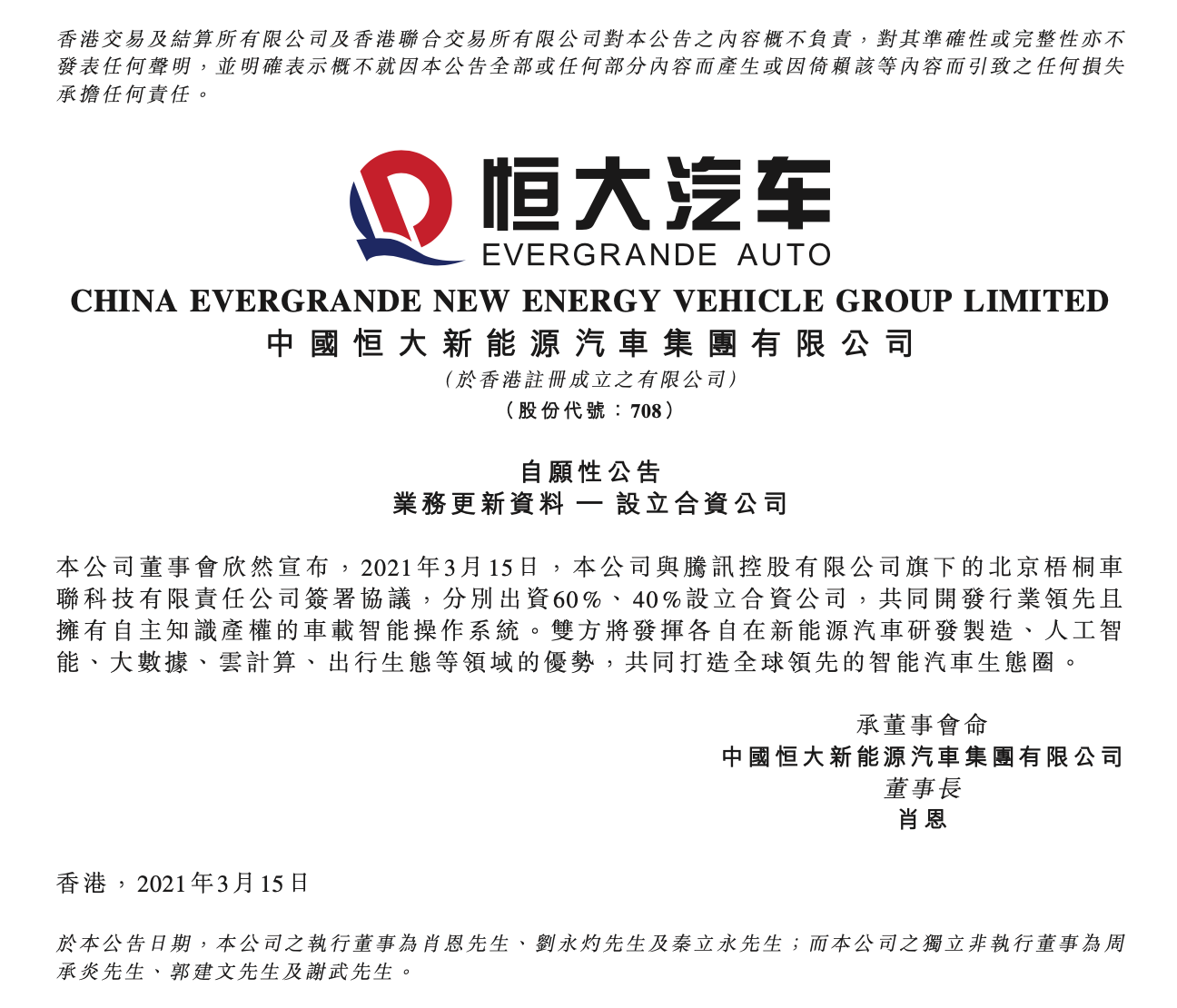
According to the announcement, the two parties will give full play to their respective advantages in new energy vehicle R&D and manufacturing, artificial intelligence, big data, cloud computing, and travel ecology, and jointly create a world-leading intelligent automobile ecosystem.
Quick Comment:
In August last year, Evergrande Motors launched six models covering all levels from A to D, including coupe, SUV, MPV, and crossover, etc., and stated that ‘trial production will begin in the first half of next year, and mass production will be gradually realized in the second half of the year.’ Now, Evergrande Motors has announced that it will work with Tencent to develop car machines. The first quarter of 2021 is coming to an end, and the schedule for the next few months is quite tight.
Toyota releases X prologue teaser imageOn March 10th, the official Toyota Europe website suddenly released a teaser image announcing that a new car named X prologue will be unveiled on March 17th at 18:00 Chinese time.

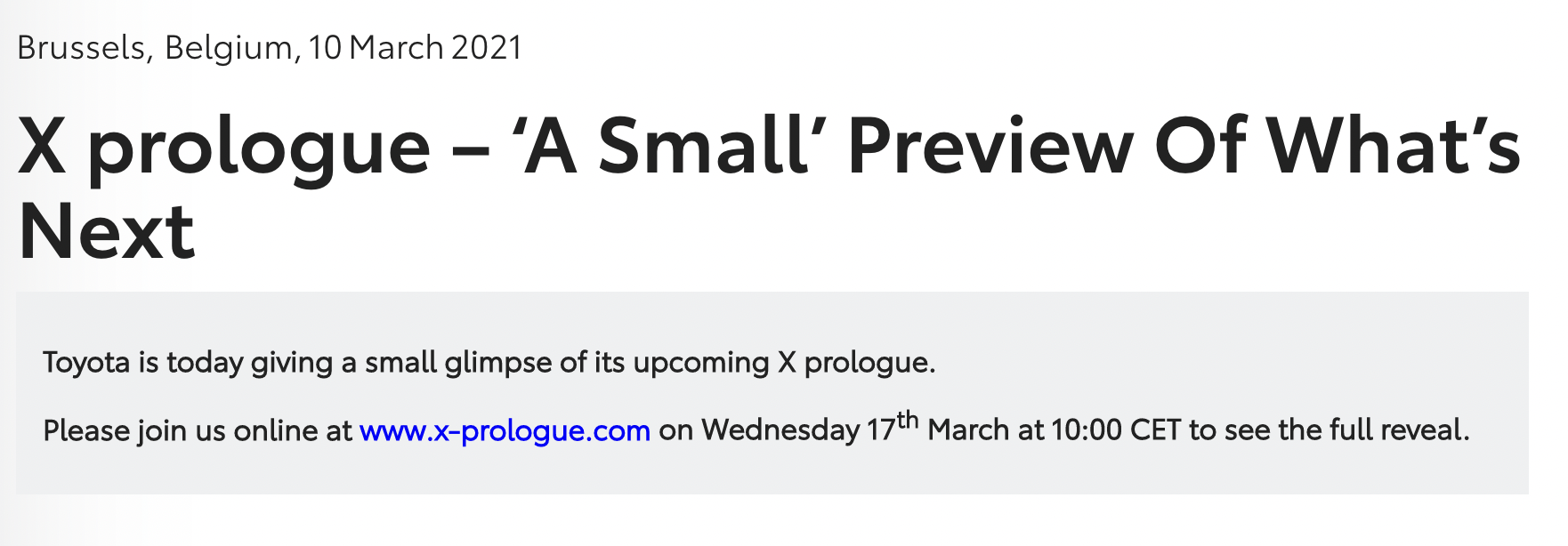
Quick Comment:
Judging from the current information, the appearance of the phrase “A Small” in the title should be a pun, which can be understood as a possible A-level car model, i.e., compact class. The design language of the car lights and front end shown in the teaser image above is significantly different from previous Toyota models. Although the scope of the image is small, it seems that this car is likely to be a pure electric vehicle judging from the design of the presumed grilleless front end.
Tesla (Shanghai)’s Business Scope Changes Again: No Longer Include “New Energy Vehicle Battery Swapping Facilities Sales”
On March 10th, according to the latest information on Tianyancha, Tesla (Shanghai) Co., Ltd., as the operating entity of Tesla in China, once again changed its business scope, reducing the sales of “new energy vehicle battery swapping facilities,” “battery sales,” “photovoltaic equipment and components sales,” and other contents.

(Screenshot taken on March 1st, source: Tianyancha)

(Screenshot taken on March 10th, source: Tianyancha)
As early as 2013, Elon Musk stated that Tesla had tried the battery-swapping mode on Model S and operated the prototype equipment for a period of time, but due to its high operating cost and charging fees far more expensive than supercharging, the actual usage rate was not satisfactory. Eventually, Tesla believed that the battery-swapping model had low operating efficiency and was not suitable for large-scale promotion, so it gave up this approach.
Quick Comment:
Regarding the issue of charging and swapping, the relevant person in charge of Tesla had stated in an interview that “Tesla does not do battery swapping,” and Tao Lin also stated on Weibo that “Charging is the best way to supplement energy for large-scale civilian electric vehicles.” Based on the latest developments, Tesla is basically not going to carry out battery swapping anymore.### LG Plans to Produce 4680 Batteries for Tesla in 2023
According to Reuters, LG Energy Solutions plans to produce 4680 batteries for Tesla in 2023 and is considering investing in factories in Europe or the United States. Reuters cited unnamed sources saying that LG plans to build a new 4680 production line to supply Tesla’s Berlin Super Factory.
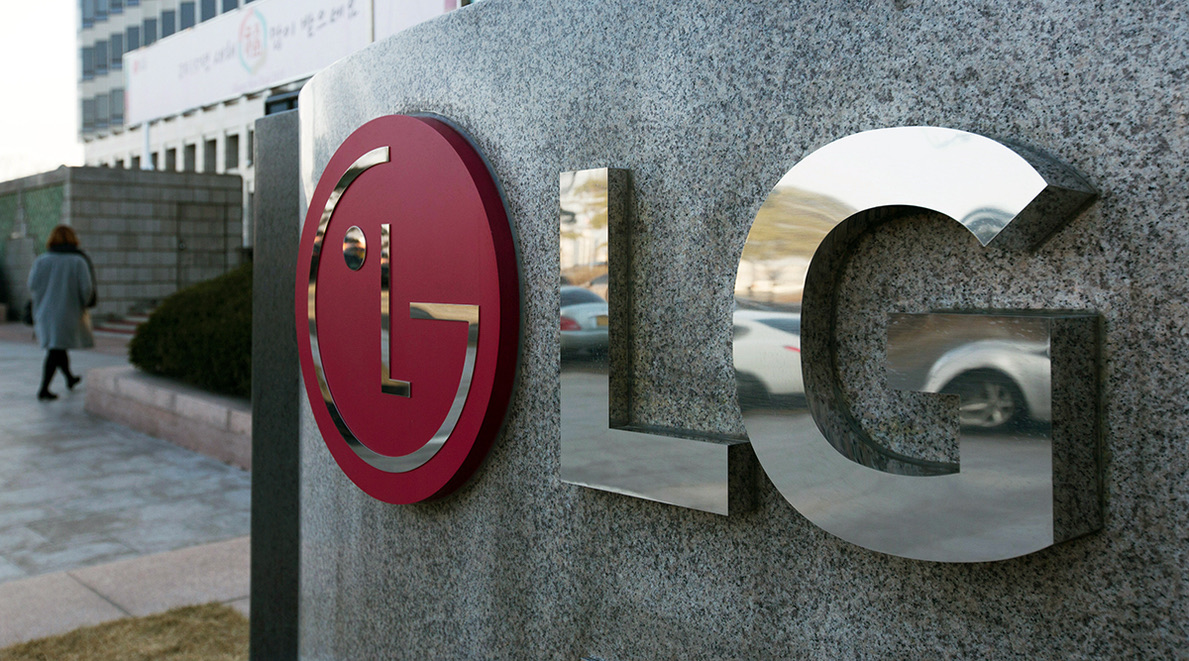
_ (Image source: Bloomberg News)_
Currently, LG has not commented on the above content. At present, LG has a joint venture with General Motors in Lordstown, Ohio, worth $2.3 billion, and supplies batteries to General Motors. Lucid Motors has also signed a multi-year supply agreement with LG.
Brief Comment:
However, there have been frequent unfavorable news reports about LG recently. As one of LG’s important competitors, Panasonic plans to launch a test line for 4680 batteries in early April. SK, also a South Korean company, submitted a ruling to the US government to overturn LG’s favorable policy. Lucid Motors is also very interested in battery manufacturing. Currently, the competition in the field of power batteries is becoming increasingly fierce.
Huawei Joins Hands with GAC Aion to Develop the Next Generation of Intelligent Electric Vehicles
On March 9, according to Caixin, Huawei teamed up with GAC Aion to develop the next generation of intelligent electric vehicles, with each party investing more than 100 people in R&D teams.

In response, after further inquiry from the Pengpai News, GAC Group replied that it signed two strategic cooperation agreements with Huawei starting in 2017. In September 2019, the two sides deepened their strategic cooperation agreement, focusing on computing and communication architecture, embracing the trend of the development of software-defined cars, and conducting joint research on intelligentization, network connection, and electrification. They will jointly build a sustainable and iterative digital platform to truly achieve software-defined cars. GAC Group will announce specific cooperation progress at the appropriate time, so stay tuned.
Brief Comment:# Huawei Collaborates with Auto Companies to Build High-end Smart Cars
It’s not the first time that “cars” have appeared in Huawei’s news. In November last year, Changan Automobile announced its cooperation with Huawei and CATL to create a brand new high-end intelligent automotive brand. And at the end of February this year, Reuters exclusively reported that Huawei plans to launch its own branded electric vehicles and is expected to launch some models this year. Despite Huawei’s repeated denial of building cars, there are still many companies hoping to team up with Huawei to “build good cars” at present.
This article is a translation by ChatGPT of a Chinese report from 42HOW. If you have any questions about it, please email bd@42how.com.
